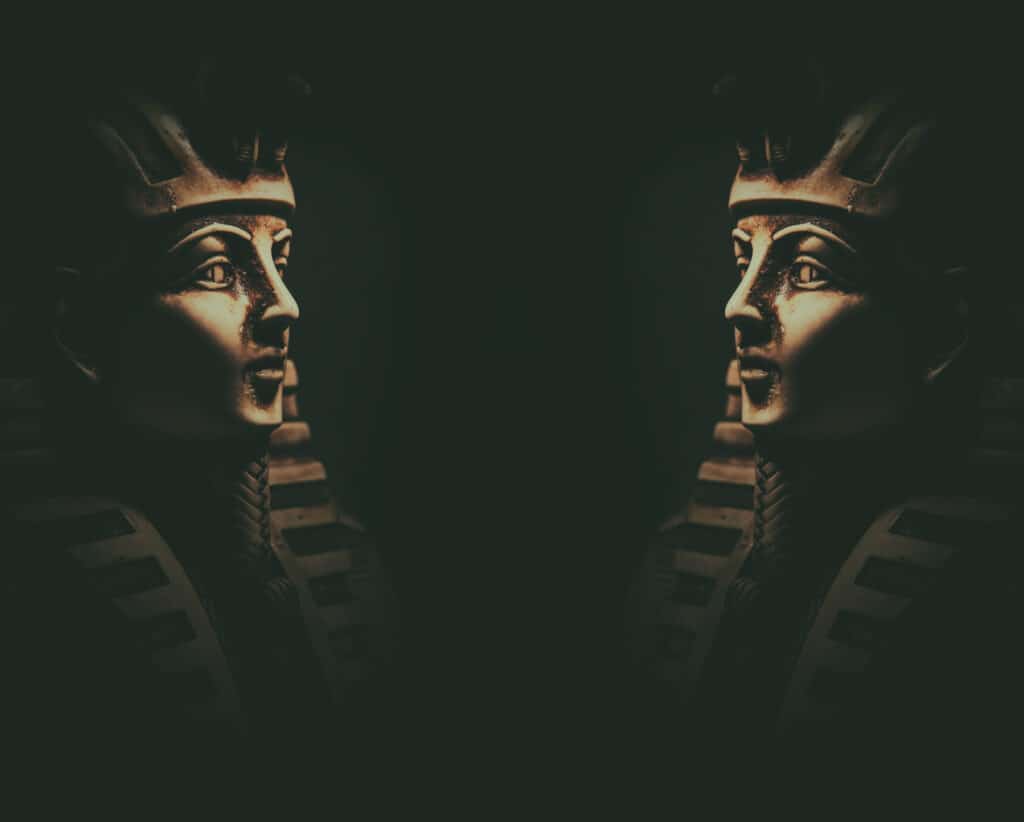“We are never better deceived than when we deceive ourselves.”[1]
“We hold these truths to be self-evident, that all men are created equal [but not equal to God], that they are endowed by their Creator with certain unalienable Rights, that among these are life, liberty, and the pursuit of happiness [Not included is the right to run the cosmos or to even pretend that you can run the cosmos].”
“Then the Lord said to Moses, Pay close attention to this. I will make you seem like God to Pharaoh, and your brother, Aaron, will be your prophet. Tell Aaron everything I command you, and Aaron must command Pharaoh to let the people of Israel leave his country. But I will make Pharaoh’s heart stubborn so I can multiply my miraculous signs and wonders in the land of Egypt. Even then, Pharaoh will refuse to listen to you. So I will bring down my fist on Egypt. Then I will rescue my forces—my people, the Israelites—from the land of Egypt with great acts of judgment. When I raise my powerful hand and bring out the Israelites, the Egyptians will know that I am the Lord.” (Exodus 7:1-5, NLT)
God insists that he defeat his enemies. He has plenty of them, more than the average guy, more than Moses, even more than Vladimir Putin. This is because every person in the human race is God’s enemy.[2] He clearly stated, “You must not have any other god but me.”[3]
Let’s face it: we want to be God, at least to be our own gods, run our own show, and be free to remake the world our way. Down deep, we think we could do a better job. You don’t believe me? Read the story of the ten plagues.
“You must not have any other god but me.”
Ok, that bit with the staff becoming a snake was nifty, but turning the waters into blood, abusing all those cute little frogs and piling them in heaps all over the nation, gnats and flies in nostrils, might be sort of okay. But killing all the livestock, even the family dog, boils, hail, locusts, darkness, and finally killing the firstborn of every living thing from the palace to the pig pen?
When you read the full account of all ten plagues, jot down your initial thoughts. Like me, you recoil at the hell that God brings down—it’s something that violates our human sensibilities. Yet, we are made in God’s image. We had it good in the Garden of Eden, still, we had to say “you’re not the boss of me,” and give our way a try! What a mess we made, and now God is cleaning up the mess, and it’s not pretty. Frankly, none of us has the stomach for it. Be honest—you wouldn’t have done it that way!
What does that all mean, what does it prove, and how does it help? God answers:
“When I raise my powerful hand and bring out the Israelites, the Egyptians will know I am the Lord.”
God is saying, “Pharaoh will know, Moses, you will know, and all of Israel will know.” And forgive me for reading ahead, “ …at the name of Jesus every knee should bow in heaven and on earth and every tongue confess that Jesus Christ is Lord to the glory of God the Father.”[4] God not only is insistent, but he has given his all to grind his enemies into the ground and eliminate them from existence. Total victory, no compromise, no clemency, it must be this way.
The heart is deceitful: “When I raise my powerful hand and bring out the Israelites, the Egyptians will know I am the Lord.”
As long as even one of us stands in opposition to him, his work is not done. He gets all the glory because it is all his in the first place. He created all things, or there would be no material universe. When he reconciles all things to himself, all the credit or glory returns to its source. He shares it freely with us, but in the end, we give it back to him because it all belongs to him. He has no rivals, because only then will we, his people, have peace and rest, and all creation can be healed—you can’t have heaven without it. So much for the abstract. Now we will see God’s heart and his interaction with his rival, Pharaoh.
That hardening of the human heart
This doesn’t seem like a fair fight. First, God tells Moses that he will harden Pharaoh’s heart. His statement of purpose is not hidden: “But I will make Pharaoh’s heart stubborn so I can multiply my miraculous signs and wonders in the land of Egypt.” A cynic would charge that God wants this to be a long and drawn-out struggle to be a showcase for his power and singularity. This seems so, but why does God want it this way? Once again, it must be said: for the ultimate redemption and reconciliation of his creation and his people. The first five plagues show that Pharaoh was a stubborn man who hardened his own heart. Most great leaders are stubborn, not easily broken, and fight harder and harder in the face of opposition. In plagues 6-10, God hardens Pharaoh’s heart. Pharaoh’s knees buckle many times, but when the plagues stop, and there is a period of relief, his knees stiffen again.[5]
As soon as Pharaoh’s nose cleared of gnats and flies, dead frogs and cattle piled up, the air filled with stench, and Pharaoh was ready to settle, but after a week or two of relief, his resolve stiffened. This was God using man to accomplish his purpose, which ironically, meets man’s need. That is the character of God, and only he understands humans enough to coach us, persuade us, and even to control us.
“The human heart is the most deceitful of all things, and desperately wicked. Who really knows how bad it is? But I, the Lord, search all hearts and examine secret motives. I give all people their due rewards according to what their actions deserve.”[6]
The heart is deceitful: “The human heart is the most deceitful of all things, and desperately wicked.”
The most complicated, deceitful, and wicked thing on earth is the heart. The heart is a metaphor for that immeasurable, unweighable, invisible, immaterial nature of a human, which is at a person’s center, and represented by the physical heart. God alone is competent to counsel us in such matters. The Psalmist David asked for it:
“Search me, O God, and know my heart; test me and know my anxious thoughts. Point out anything in me that offends you, and lead me along the path of everlasting life.”[7]
The unfinished painting
The devout seek God’s counsel, relish his help, and want to find the spiritual sweet spot. Those who resist, however, get the same expert work. The heart that resists God may not have the stamina to stand against God. When the situation demands that they have that stamina, God stiffens the heart to give them time to work his purpose. In this case, long enough to convince everyone that God alone is God. And yes, to get two million Jews out of Egypt. During the second half of the plagues, God strengthens Pharaoh’s stubbornness; he stiffens his resolve. Thomas Aquinas mentions this process:
“God causes and moves our will, and yet without the will ceasing to be free.”[8]
God is working outside of time and space with a complete painting that is based on his knowledge. Those of us living in time and space are still painting. We are still choosing, we are still believing, not believing, struggling, and fighting the powers that be. God has and continues to contend with celestial minds and wills, such as with Lucifer. But at the human level, he is working with people to give them the will to do his work for his good pleasure. He surprisingly often uses the uncooperative. Pharaoh certainly qualifies for this mystical work.
The heart is deceitful: “God surprisingly often uses the uncooperative.”
Pharaoh breaks
Finally. It took two kinds of humiliation. The first was that during plagues 6-10, the Jews living in the land of Goshen were spared. It was graphically described by what God instructed Moses to tell the Pharaoh:
“All the firstborn sons will die in every family in Egypt, from the oldest son of Pharaoh who sits on his throne to the oldest son of his lowliest servant girl who grinds the flour. Even the firstborn of the livestock will die. Then a loud wail will rise throughout the land of Egypt, a wail like no one has heard before or will ever hear again. But among the Israelites, it will be so peaceful that not even a dog will bark. Then you will know that the Lord makes a distinction between Egyptians and the Israelites.”[9]
The warning was not enough. Ignoring seems to be a part of the human condition. Warnings given by prophets during ancient times were usually ignored. Pharaoh was a different case; he was under a great deal of pressure as the king of one of the greatest kingdoms in world history. He was trying to survive a bad period of political turmoil. After all, his magicians could duplicate several of Moses’ miracles.
The heart is deceitful: “Ignoring seems to be a part of the human condition.”
Warnings from the church to the world are common, but the ones that are heeded are few. Every kind of prophetic doom and gloom fills the airwaves and the social networks. The majority of them are not religious. Television preachers stand out, but are like street signs and buildings we drive by daily. They are easily ridiculed; it is compulsory not to take them seriously. There is a spiritual renaissance taking place in America, spreading on social networks, below the commanding heights of elite culture. The world could come to an end, and all the eligible people go to heaven, and no one at the White House Correspondents Dinner would notice.
The events that led to the first Passover were horrid; they smashed our sensibilities. Finally, Pharaoh knew he had lost and gave in. The Israelites left, took whatever they wanted, and Egypt said good riddance.
What now
But what is God saying to us right now, what are we not listening to, and what will break us? God is always up to the same thing. His purpose is to demonstrate that “When I raise my powerful hand and bring out the Israelites, the Egyptians will know that I am the Lord.” 1400 years later, God’s son, Jesus, wept over Jerusalem. Israel’s elite had rejected him. But he gave himself away—the lamb of God who would take away the sin of the world.
[1] Joseph Bottum
[2] Ephesians 2:1-3, Romans 8:6-7.
[3] Exodus 20:3.
[4] Philippians 2:10-11.
[5] There are differing opinions about the plagues’ time frame. Some present the 10 plagues over a period of 50 days in the year 1446 BC. Passover is calculated using the Hebrew calendar. Others do not disagree on the general years that it happened, but think each plague lasted a week, followed by a period of relief, which could have stretched the period to as much as ten months.
[6] Jeremiah 17:9-10, NLT.
[7] Psalm 139:23-24, NLT.
[8] Brian Davies, The Thoughts of Thomas Aquinas (Oxford: Clarendon, 1992), 267.
[9] Exodus 11:5-7, NLT.
From Bill Hull’s ‘No Longer a Bystander.’ Used with permission.











